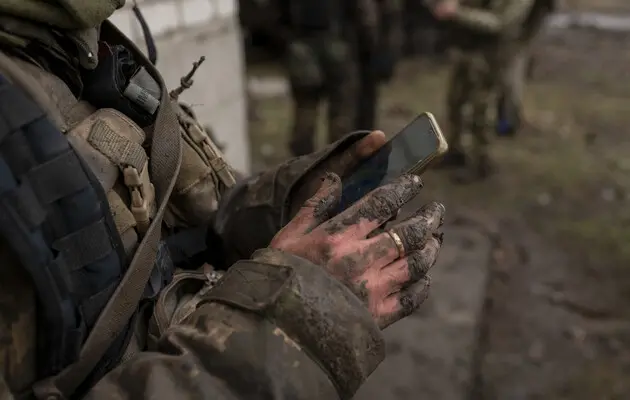Waiting...

“We are moving into position at night. There will be no connection for three days. I gave your phone number to my guys. May I? I know that should anything happen you will get to the ends of the earth to get me out of there,” my brother-in-arms writes to me.
From this moment on, I mentally move into this position. I collect my things. I check whether the tourniquets are well fixed and make sure that the cartridge pouchs do not impede my movements. In the morning, I hop out of bed because there is less than an hour left until dawn. With the first rays of the sun, I am already there, in a distant windbreak. I listen to the sky and dig a hiding place.
I was there for three days. Every second. I listen to movements inside me. I know how I will feel if something happens. Because through his veins flows a part of my blood, which we abundantly exchanged in the bombed-out trench a year ago. A part of him flows through my veins too. That part of me, which is now in the rear, is reaching for him with all its might. Holds an invisible bond. I carry thoughts about him like a water bottle filled to the brim. I carry it carefully not to splash. And I believe that it will save him.
The next night I wake up to his voice: “Read the message. It’s urgent.” I pick up the phone and see nothing. “Was last online a day ago,” says his status. Anxiety lasts until the morning, but finally abates. After another 24 hours, he will get in touch and say that at that time the shelling began. It was difficult, but everyone is all right. All right.
If someone tells you that the worst thing is to assault windbreaks or go on the offensive through minefields, don't believe it. You don't have time to be scared there. The worst thing is to wait. Not being able to do at least something; be mad with impotence; live with the phone in your hands; monitor all websites — ours and enemy's alike — reporting events in that part of the frontline; mentally hold his hand, not letting go of it. Believing that inner connection will hold him or her above the abyss.
***
“How are you?,” I ask a friend whose husband is in the “most popular” part of the front.
“He contacted me a week ago. He said that they can’t launch Starlink and that I should not worry.”
“I’m not asking how he is. How are you? You are alone.”
“Weaving camouflage nets. It calms me down.”
She weaves nets. Kilometers of them, as if trying to cover the entire frontline. Sometimes she wakes up in the middle of the night and weaves because there is nothing else to console her until dawn.
***
Marichka cleans the house. It looks like a sterile operating room. The only things out of place are those of Valerii. The shirt he threw on the back of the chair, the book on the windowsill in the kitchen, the house slippers in the room. Amid nervous sterility, they are the anchors she has being holding on to for a year that he has spent in captivity.
***
Svitlana plants roses. She says that when he returns there will be so much of them that will be no room to walk. Her husband has gone to his first deployment in the war zone.
***
“How are you?”
“Screw it, I will break up with him, but let him come back.”
Her husband is one of those people who hardly gets in touch. And when he does, he doesn't say anything. She does not know the phone numbers of his comrades, does not know the number of the brigade, does not know where their positions are. She can guess some things. But she does not know anything for sure. This ignorance is harder than the worst stories.
“Even at a distance he gets on my nerves. I’ll divorce him. But let him return.”
***
Five-year-old Stasyk hardly speaks. He revives only when dad gets in touch. He grabs the phone and runs away with it to his room. Laughter can be heard behind the tightly closed door. Mother sits near the door, trying to soak up these moments. Moments when they both briefly come back, husband and son. Stasyk waits the rest of the time. Concentrated, as if doing important work.
***
“How are you?”
“Feeling bad today. The child refused to go to kindergarten because dad hadn’t called for two days. He’s afraid to miss the call. And I dream of only one thing — let him get wounded. I'm tired of being afraid. I want to know that he is safe, at least for the duration of the treatment.”
***
“How are you?”
“Everything’s fine. Repulsed three attacks at night. Writing a message for my family now.
His family is sure that he is serving in Kramatorsk. They are still worried because missiles hit there from time to time and you can die just standing in line for coffee. Only I, as an old friend, know that he is away in another city. After all, someone should know where to look for his body, should anything happen. When things get tough for him, he writes to me: “Tell my family that there is no light at home, and I cannot go out to call them. Couldn't get through. Everything is fine, I cooked borshch, I'm going to wash my clothes.”
I make screenshots of individually written messages and forward them to the family. His parents have barely learnt how to use Viber, and it's easy to deceive them. They thank you and ask if the blackout will last long. They sigh that without light he will have to wash by hand, and borshch will turn sour without a refrigerator. And he knows that they still have a few days of quiet life. While they believe in the absence of light and worry about the damned borshch. While he repels another attack in the middle of the ruins of a vanished city.
***
“Give me a plus.”
“Give me a plus.”
“Give me a plus!”
He repeatedly writes to familiar numbers. Several hours pass between messages. Unread. Unread. Unread. His group was supposed to leave positions two days ago. He was unlucky on the way there. Caught a shrapnel and is lying in a crowded hospital waiting for the second operation in a row. Everyone answered him dozens of times, from the company officer to the medic. They are fine. But they can't get out yet. They can get in touch, just wait. Don’t bother us, it's hot here.
Doctors and nurses want something from him. Volunteers brought strawberries. Your wife called. They all seem to be somewhere out there, outside of his reality. Reality has shrunk to the size of a phone screen.
“Give me a plus.”
“Give me a plus.”
“Give me a plus.”
...Pluses will come almost simultaneously from all numbers. He will see them only in a day, when he comes off anesthesia after the operation. He will see them and for the first time in many days he will be able to take a deep breath. Alive. Still alive today...
***
“We got out of there.”
“Stay in touch.”
“+.”
“How is the little one? Will you put him on the phone?”
“Mom, I ate and I’m wearing a hat :)”
“Honey, how are you? I miss you.”
The heart remembers how to beat again. The world around becomes colorful again. I know how to smile. Amazingly. I can still smile. One more minute. Please stay in touch. Let me feel that you are alive. That I am alive. That my world will not stop today. Because as soon as you hang up the phone, time stops again. I won't be here. I will be by your side, somewhere in the dark. I will hold your hand and believe that I can hold it firm enough...
Please select it with the mouse and press Ctrl+Enter or Submit a bug











 Login with Google
Login with Google